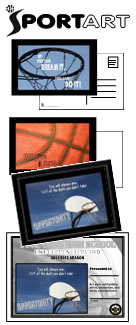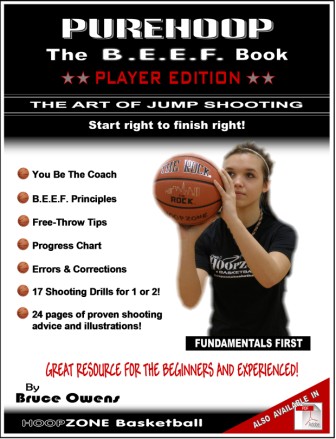 When discussing guard play, we enter probably the most complex area of basketball. Your team's guards fill such a variety of roles that is difficult to cover all the changing responsibilities -- not only from game to game, but sometimes from play to play. None of the other positions have to make as many adjustments and changes as your guards do. No other position has to be as instantly adaptable as your guards have to be. However, some principles of guard play are consistent regardless of the situation, and those are the ones we will cover here. When discussing guard play, we enter probably the most complex area of basketball. Your team's guards fill such a variety of roles that is difficult to cover all the changing responsibilities -- not only from game to game, but sometimes from play to play. None of the other positions have to make as many adjustments and changes as your guards do. No other position has to be as instantly adaptable as your guards have to be. However, some principles of guard play are consistent regardless of the situation, and those are the ones we will cover here.
Obviously, your guards should be able to shoot and handle the ball. They should have the ability to pass and play defense. But that is what we want of all our players. We will go over some drills that might improve your players in these common areas.
Because the guards always have the ball, the entire team looks to them and will take on their personality. They can be fiery and emotional, but they have to funnel that energy in a positive direction. They cannot get down on their teammates or show their frustration when things don't go right. They always have to remain in control of themselves and the team. Your team will look to your guards for direction and calmness. They cannot lead if the team does not trust them!
Your guards are the gas and the break pedals of your team. They must understand the pace that you need to play to be successful, the pace of the game as it is being played, and any adjustments that need to be made. They must have a feel for situations related to time and score, scoring runs, and scoring droughts. Reacting properly will go a long way toward your team being successful.
H O O P E R X O F F E N S I V E XXG U A R D X T I P S |
BE A LEADER IN PRACTICE
Great point guards get their teams prepared psychologically for practice and for games. They know which players need to be provoked to pick up intensity or concentration and which ones are excitable and need to be calmed. Encourage your team!
TEAM PHILOSOPHY
Great point guards understand completely a coach’s playing philosophy from top to bottom and every ounce of energy and effort is put forth to execute that philosophy. Like the football quarterback a great point guard must have the full package. Ask questions of your coach, listen and put it in play.
DETERMINATION
Guards need mental toughness. You will never quit. It is the one area that separates a good player from a great player. You give maximum effort all the time in relentless pursuit of your game plans. You keep achieving regardless of the conditions. Your attitude remains positive and consistent over time.
MASTER THE DRIBBLE
It goes without saying, but a great point guard needs to be in complete control of his dribble. The ball should be an extension of the player himself. You should master all of the dribbling moves in the Ball Handling Moves section of the site.
ASSISTING
Great guards seldom turn the ball over due to pressure, and when they deliver a pass to a teammate it is to a point closest to the best position from which their teammate can score.
UNIQUE SITUATIONS
Great point guards pay attention to situational advantages such as on the free throw line, during jump balls, or just during the flow of the game. For example, when an attacking team has a penetrating guard with no one getting back for defensive balance, they know to attack hard and quick on the counter fast break.
SPACING
The most valuable commodity on the basketball floor is space. Proper spacing allows players to have room to operate, to slash to the basket, and makes your team more difficult to defend. Your guards are in charge of space!
SEEING THE FLOOR
Great guards always have their head up and maintain full court vision at all times. They see all the players on the floor and looking for opportunities.
COMMUNICATING
Great point guards quickly and clearly communicate play calls or changes both in the open court and on dead ball situations. They also have the ability to quickly organize a team after an offensive pattern breakdown.
KNOW WHO YOUR SCORERS ARE
Great point guards not only know who can score, but also where they are most effective on the court. Your job is to put your teammates in positions where they can be successful.
PASSING INTO THE POST
The biggest mistake players make is letting the defense know what you want to do well before you actually do it. When your big man is ready for the ball he will hold is hand out to tell you where he wants it. When this happens, you not only have to worry about the defender on his back, but also your defender, both of whom want the ball that you possess. This is when you implement one of my basics of offensive basketball. "Show the defender the exact opposite of what you want to do".
FIND THE OPEN SPOT
Perimeter players will often need to create space from their defenders so that they can receive a pass from a teammate. Usually the best way to get open is to use a "V-cut". Time the V-cut so that as you are coming out of the cut as your teammate is ready to pass the ball.
WORK TOGETHER WITH YOUR POST PLAYERS
You scratch my back and I’ll scratch yours. Guards must work and utilize their big post players. They are your work horses. They are the ones that "have your back" whenever you get beat off the dribble. Sharing the ball and utilizing the inside outside game will open things up for everyone.
UNDERSTANDING WHEN TO RUN
A great part of a guard nowadays is the ability to run the fast break. As a guard, your job is to know when you have numbers, when you don't. Once you begin to push the ball you must know what kind of defensive numbers you’re faced with. Also knowing when to pass the ball on the break is important.
NEVER PICK UP THE DRIBBLE
The most common mistake of inexperienced guards is "giving up their dribble". Once this happens, the defense is taught to collapse on you and trap you. In most cases it is a habit but remember that unless you have a planned option with the ball don’t pick it up
BE A TRIPLE THREAT
All guards must be able to score and make plays from the Triple Threat position. Many times within an offense, guards will receive the ball in this position, and the more effective you are from Triple Threat, the more effective you will be. If the defense is faced with an offense that has many weapons they are in trouble.
DRIVE AND DISH
The secret to a successful drive and dish is keeping your head and eyes looking around. As you beat your man, and as the help defender is coming toward you, pass off to your teammate at the last possible moment, leading to easy buckets. The dribble penetrate must be a threat to score or the defense will not bother to pick up. Lots of practice time spent on this will help come game time. It is more reaction technique than anything else.
H O O P E R X D E F E N S I V E XXG U A R D X T I P S |
TALK ON DEFENSE
A great guard talks constantly on defense helping their teammates to recognize potentially dangerous points of attack by their opponent, screens, etc.
STOPPING THE DRIBBLE PENETRATION
Guards are the first line of defense and have to stop dribble penetration. Dribble penetration is the one killer of all defenses. Allowing opponents to dribble penetration will lead to foul trouble and of course easy baskets.
HUSTLE BACK ON D
One of the most important jobs as a Guard is to get back on defense and get to work. This means never getting "sucked" in too deep, allowing for easy buckets in transition. Usually the Point Guard is responsible for getting back, but if the Point Guard penetrates the defense, it is then the Shooting Guard who is responsible for protecting the basket against the fast break. Good communication is key.
PRESSURING THE BALL
Guards need to keep constant pressure on the passer or ball handler, forcing them off of their desired path of attack. Over play the opponents strong hand and force them to use their weak hand. This will help your big men by forcing the offense into uncomfortable situations, often times taking post players away from their "sweet" spots on the court.
Time to get to work,
Coach O
|





 When discussing guard play, we enter probably the most complex area of basketball. Your team's guards fill such a variety of roles that is difficult to cover all the changing responsibilities -- not only from game to game, but sometimes from play to play. None of the other positions have to make as many adjustments and changes as your guards do. No other position has to be as instantly adaptable as your guards have to be. However, some principles of guard play are consistent regardless of the situation, and those are the ones we will cover here.
When discussing guard play, we enter probably the most complex area of basketball. Your team's guards fill such a variety of roles that is difficult to cover all the changing responsibilities -- not only from game to game, but sometimes from play to play. None of the other positions have to make as many adjustments and changes as your guards do. No other position has to be as instantly adaptable as your guards have to be. However, some principles of guard play are consistent regardless of the situation, and those are the ones we will cover here.